When Should You Start Socializing Your Ferret With Others?
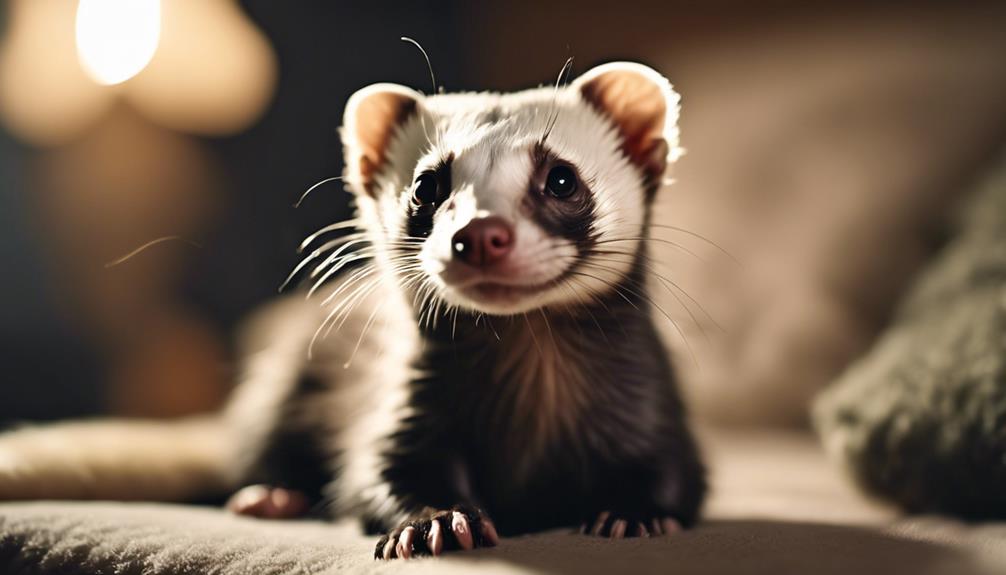
Socializing your ferret is an important process that should begin as early as possible. Starting when they are young will help them become more accustomed to handling and interaction with humans. It is recommended to handle your ferret gently and frequently to build trust and confidence. Introduce them to a variety of experiences, such as different people, places, and sounds, to help them feel comfortable in various environments. Patience is key when socializing your ferret, as every animal will progress at its own pace. Remember to always use positive reinforcement and rewards to encourage good behavior. With time and consistency, your ferret will become a well-socialized and happy companion.
Importance of Socialization for Ferrets
Hey there, ferret fans! Have you ever wondered why socializing your furry friend is so important? Let's dive into the world of ferret socialization to learn more about why it's crucial for their well-being and happiness.
Why is Socialization Important for Ferrets?
- Socializing your ferret is like giving them a passport to the world! It helps them develop crucial social skills and prevents behavior issues.
- By introducing your ferret to different people, animals, and environments, you're helping them become more confident and well-adjusted.
- Building a bond through socialization creates a sense of security for your pet and strengthens your relationship with them.
- Socialization can also help reduce fear and anxiety in ferrets, making them happier and more sociable pets.
In a nutshell, socializing your ferret is like giving them the keys to a happy and fulfilling life. So, grab some treats, invite some friends over, and let the socialization adventure begin!
Signs Your Ferret Is Ready
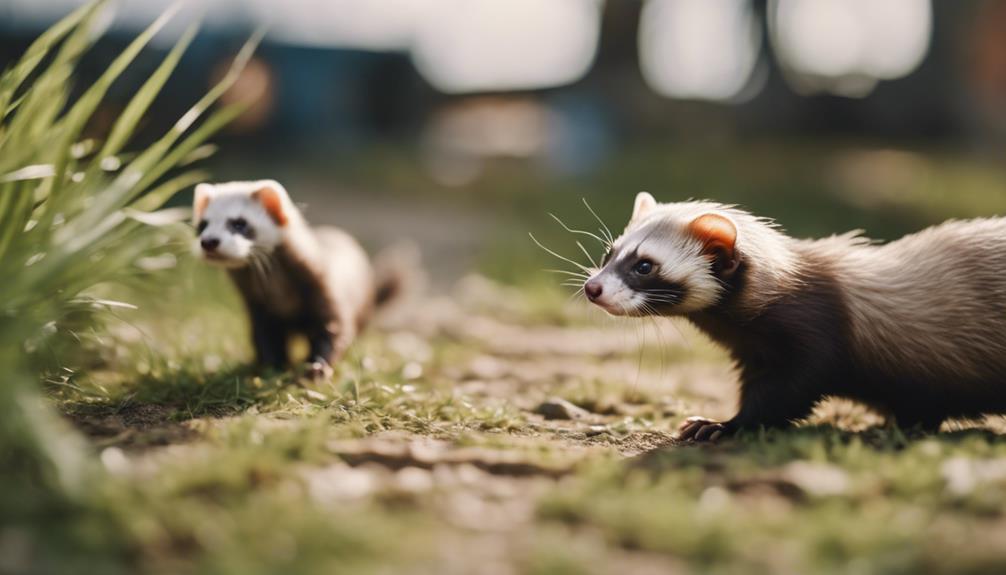
Is your ferret showing signs of wanting to make new friends? Understanding when your furry friend is ready to socialize is key to helping them develop positive interactions. Here are some cues to look out for:
- Curious Critter: Does your ferret show interest in exploring new things or meeting new people? Curiosity is a good sign they're open to socializing.
- Playtime Pals: If your ferret is bouncing around, playing games, or chasing after toys, they're likely in the mood for some social fun.
- Chill Vibes: A relaxed ferret without any signs of fear or aggression is feeling comfortable and ready to mingle.
- Friendly Approach: When your ferret confidently approaches you or other animals without hesitation, it means they're eager to connect.
Keep an eye out for these signals to ensure your ferret is happy and ready to join the social scene!
Introducing Your Ferret to Other Animals
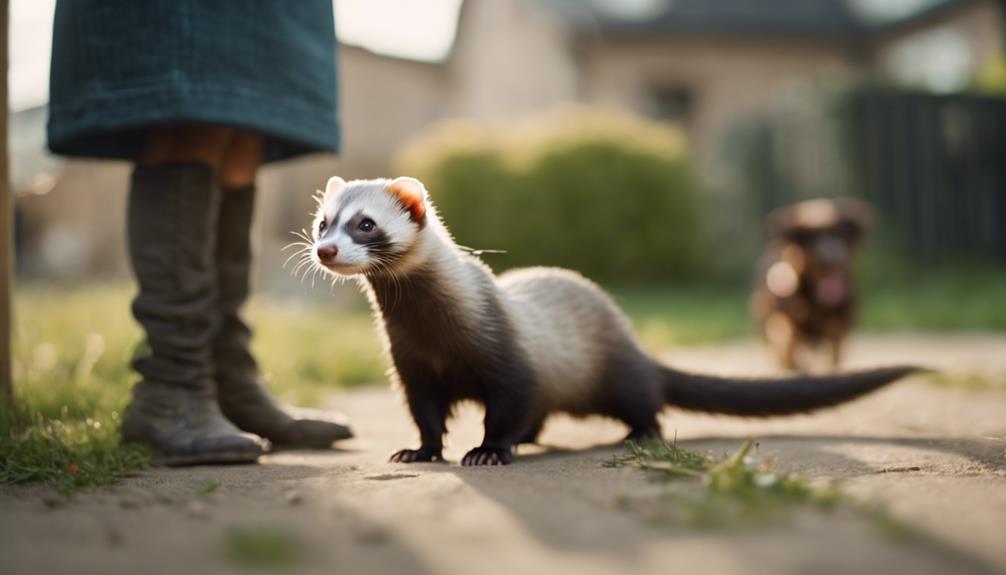
When introducing your ferret to other animals, it's essential to follow some key tips for successful animal interactions. Socializing multiple species can be beneficial for your ferret's well-being, but it's crucial to supervise their playtime to ensure safety and positive experiences.
Understanding the importance of supervised play can help create harmonious relationships between your ferret and other pets.
Animal Interaction Tips
Let's Make Friends: How to Introduce Your Ferret to Other Animals
Hey there, ferret enthusiasts! Thinking about introducing your fuzzy friend to other animals? It's all about taking it slow and steady. Here are some tips to help you navigate the world of animal interactions:
- Playtime Prep: Before playtime, double-check the area for any potential dangers. Safety first to avoid any unexpected mishaps!
- Reading Body Language: Keep an eye on how your ferret and the other animal are acting. Are they relaxed or tense? Understanding their cues is key to a successful meeting.
- Positive Reinforcement: Encourage good behavior by praising your ferret when they interact well with other animals. Positive vibes all around!
- Baby Steps: Start with short, supervised meetups in a neutral space. Let the animals sniff around and get to know each other at their own pace.
Socializing Multiple Species
How can you help your ferret make friends with other animals, like cats? Let's find out!
Creating a safe environment for your ferret to socialize with other animals is super important. Here's how you can do it:
- Start Slow: Introduce your ferret to other animals gradually and patiently.
- Sniff Test: Let your pets get used to each other's scents before they meet face-to-face.
- Positive Vibes: Use treats, toys, and praise to show your pets that good things happen when they're together.
- Keep an Eye Out: Watch their interactions closely and step in if things get too intense.
- Take It Easy: Increase the time they spend together as they get more comfortable with each other.
Supervised Playtime Importance
Why Supervised Playtime is Essential for Your Ferret and Other Pets
Hey there, ferret lovers! Are you ready to learn why supervised playtime is super important for your furry friends? Let's dive in and discover how to make playtime safe and fun for everyone!
Key Points for Playtime Success:
- Set Clear Rules: It's essential to establish boundaries to keep all pets safe during playtime. Make sure everyone knows what behavior is okay and what's not.
- Keep an Eye Out: Supervision is key! Stay close by to step in if any disagreements pop up. Your watchful eye can prevent conflicts and keep playtime enjoyable.
- Encourage Good Behavior: Positive vibes only! Reward gentle play and good manners to reinforce positive interactions between your pets.
- Read the Room: Pay attention to body language and sounds. Are your pets comfortable and happy, or is someone feeling stressed? Understanding their cues helps you adjust playtime accordingly.
With these simple tips, you can create a harmonious play environment for your ferret and other pets. Remember, supervised playtime isn't only fun but also builds strong bonds between your furry pals. Enjoy playtime safely and watch those friendships grow!
Introducing Your Ferret to People
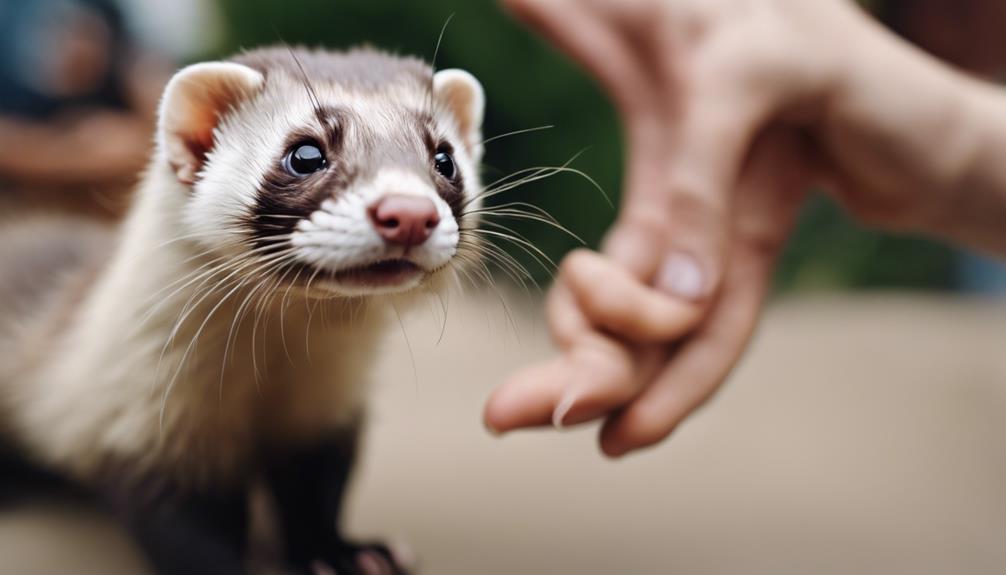
Subheading:
How to Introduce Your Ferret to New People
Hey there! Are you ready to help your ferret make some new friends? It's important to take things slow and easy when introducing your furry friend to unfamiliar faces. Here are some simple tips and activities to make the process smooth and stress-free:
Training Techniques:
- Use yummy treats to reward good behavior.
- Keep the first meetings short and sweet.
- Use a calm voice to reassure your ferret.
Bonding Exercises:
- Spend quality time snuggling and playing with your ferret.
- Let your ferret explore new people at their own pace.
- Encourage gentle petting and handling.
Socializing Techniques for Ferrets
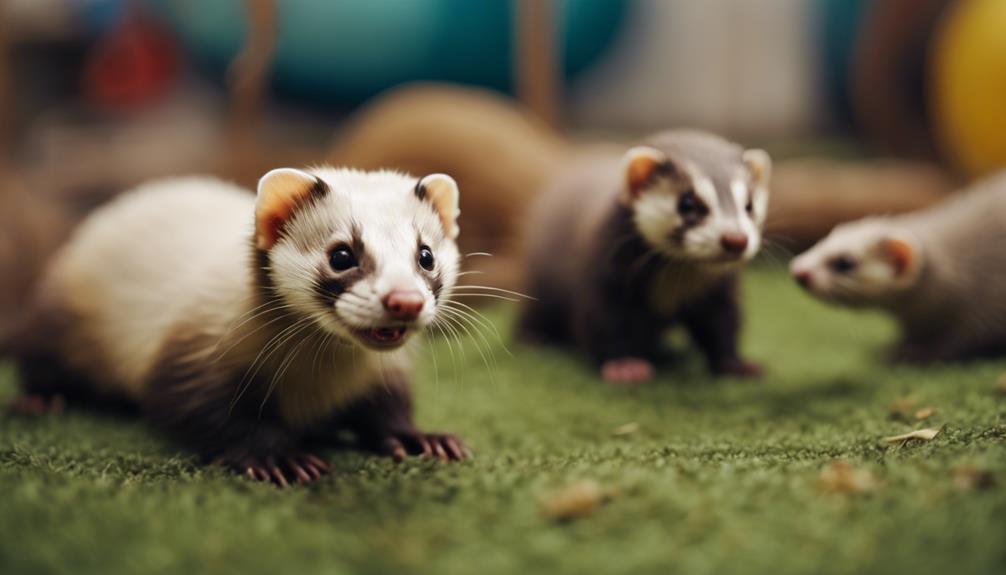
How to Help Your Ferret Make Friends
Hey there, ferret friend! Are you looking to help your furry buddy become more social? Here are some cool tips to make that happen:
- Training Fun: Use treats and praise to teach your ferret good manners. Be patient and consistent to see progress.
- Fixing Bad Habits: If your ferret nips or gets scared easily, help them change these habits with positive reinforcement.
- Fun Activities: Keep your ferret entertained with toys, tunnels, and games to boost their brainpower and social skills.
- Playtime Galore: Spend quality time with your ferret exploring new places and playing together to build a strong bond.
Monitoring and Supervising Interactions
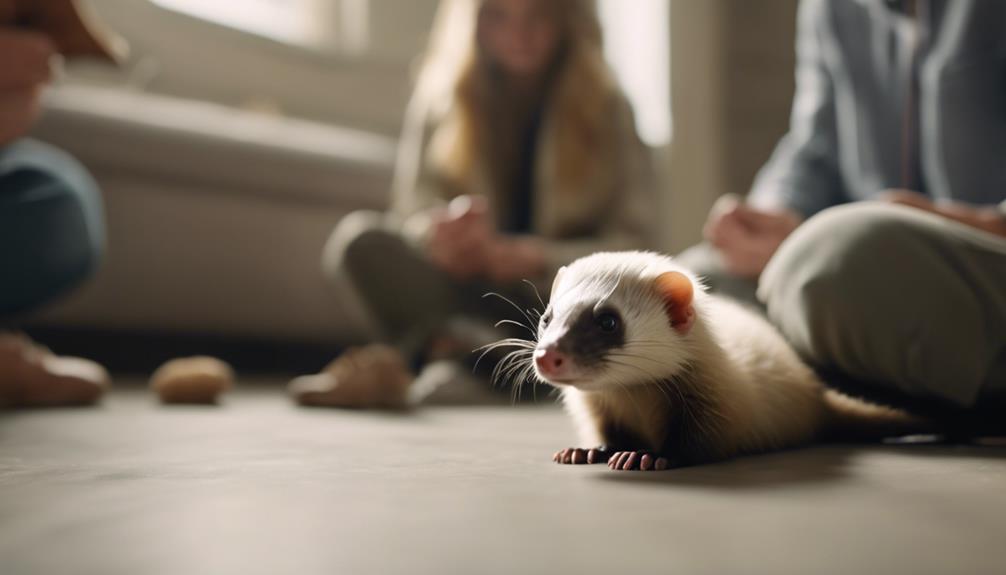
Are you wondering how to make sure your ferret has the best time socializing with others? Let's talk about some essential tips to help you supervise and guide their interactions in a fun and safe way!
� Setting up a safe play environment is crucial. Make sure there are no hazards around and that all playmates are gentle and friendly.
� Keep an eye on your ferret's behavior during playtime. Look out for signs of stress like puffing up or hissing, and watch for positive cues like relaxed body language and playful behavior.
� It's important to step in if play gets too rough or if any signs of aggression show up. Your ferret's well-being is the top priority!
� Avoid overcrowding the play area to prevent overwhelming your ferret. Limit play sessions to avoid exhaustion and watch for any signs of tiredness.
� Rotate toys regularly to keep things interesting and prevent boredom. Being present during playtime is key to quickly addressing any issues that may come up.
Troubleshooting Socialization Challenges
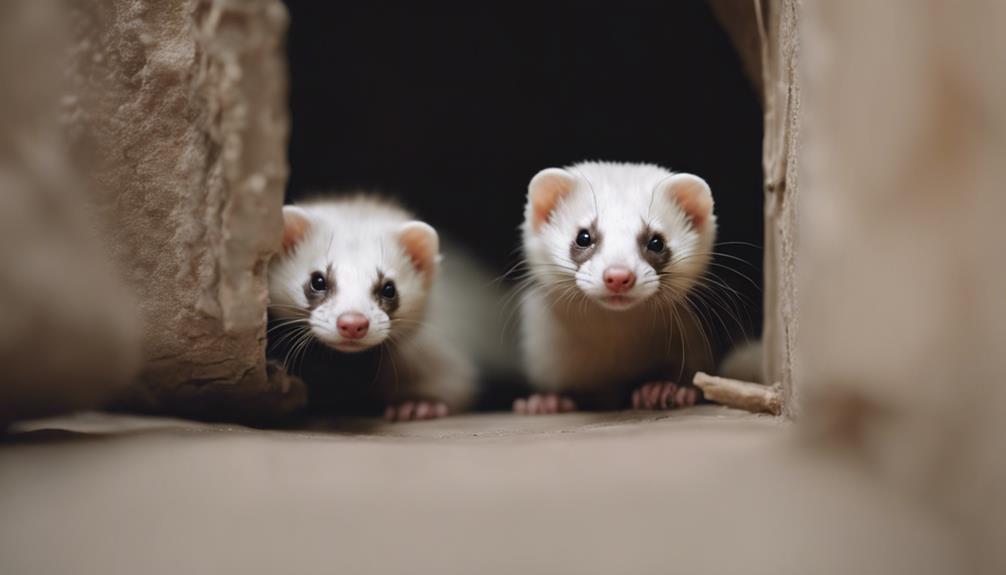
Troubleshooting Socialization Challenges for Your Ferret
Hey there! Dealing with socialization challenges with your ferret? No worries, we've got you covered with some helpful tips to make the process smoother and more enjoyable for both you and your furry friend.
How to Help Your Ferret Socialize Better
- Use Positive Training: Try using treats and praise to encourage good behavior and discourage the not-so-great ones. Positive reinforcement goes a long way in shaping your ferret's social skills.
- Spotting Triggers: Pay attention to your ferret's body language and reactions to figure out what sets off negative behaviors. Once you know the triggers, you can work on avoiding them or helping your ferret get used to them slowly.
- Take It Slow: Introduce your ferret to new social situations little by little. Let them adjust at their own pace to prevent them from feeling overwhelmed.
- Get Professional Help: If you're still facing challenges, don't hesitate to seek advice from a vet or animal behaviorist. They can provide tailored guidance to address your ferret's specific socialization needs.
Frequently Asked Questions
Can Ferrets Be Socialized With Animals Other Than Cats and Dogs?
Ferrets can be socialized with animals other than cats and dogs. For example, introducing ferrets to rabbits or guinea pigs can be successful. Careful supervision is key to ensure safe interactions and gradual acclimation.
How Long Does It Typically Take for a Ferret to Become Comfortable Around New People?
Ferrets typically take a few weeks to several months to become comfortable around new people. The socialization timeline varies based on individual temperament and past experiences. Consistent positive interactions can help in handling fears and building trust with your ferret.
Are There Any Specific Techniques for Socializing Older Ferrets Who May Have Missed Out on Early Socialization?
When working with older ferrets who missed early socialization, behavior modification and training can help. Bonding exercises and trust-building activities are key. Patience and consistency are crucial in gradually introducing them to new social interactions for positive outcomes.
What Are Some Signs That a Ferret May Not Be Enjoying Social Interactions and Needs a Break?
Body language and communication are vital in understanding a ferret's boundaries during playtime. Signs of discomfort can include flattened ears, hissing, or a stiff body. Respect these cues to ensure enjoyable social interactions and give the ferret a break when needed.
Is It Possible to Over-Socialize a Ferret, and What Are the Potential Consequences of Doing So?
Over-socializing a ferret can lead to stress, anxiety, and behavioral issues. It's essential to balance socialization needs with limits to prevent these consequences. Understanding a ferret's cues and providing breaks is crucial for their well-being.











